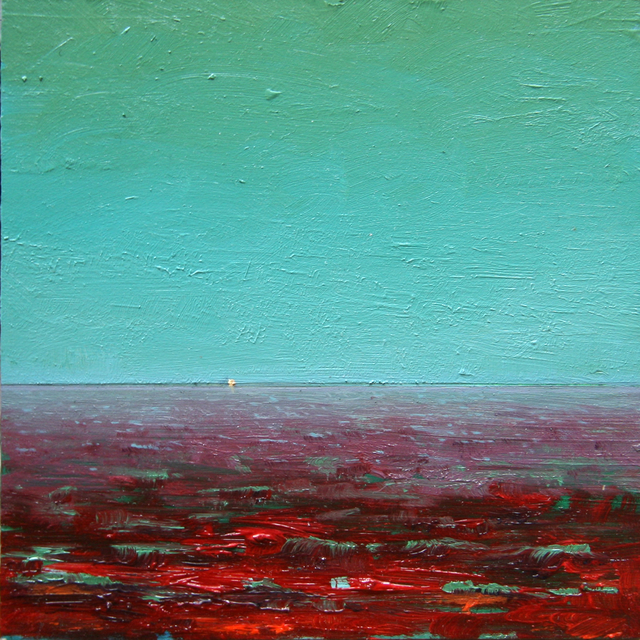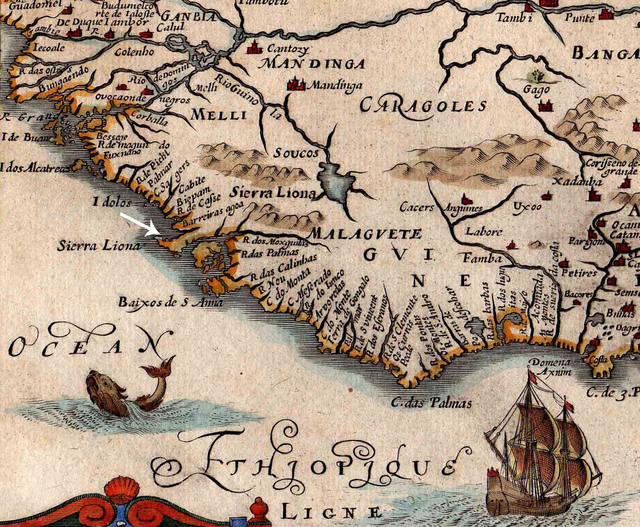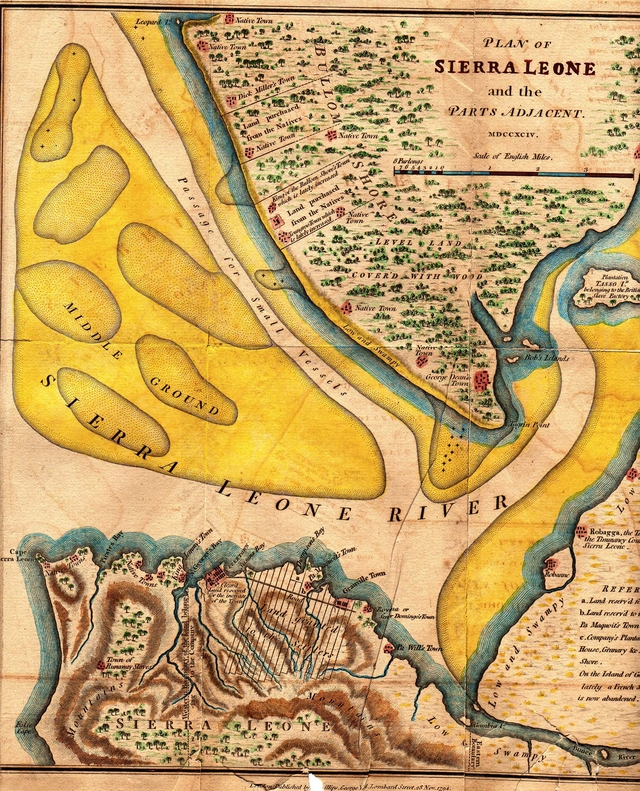Death by Chamomile? The Alimentary End of Henry Granville Naimbana

“Red Ocean,” Emily Davis Adams
On a ship in the middle of the Atlantic Ocean, Henry Granville Naimbana lay dying. It was July of 1793, and the vessel the Naimbana was wending its way from London to Sierra Leone. By the time it made landfall, Henry had lapsed into a fever from which he would never fully awaken. On July 18, 1793, British colonists living in Freetown, Sierra Leone received word of his death. Many of those colonists were former slaves—black Loyalists who ran to the British during the American Revolution, immigrated to Nova Scotia, and then departed from Nova Scotia to Sierra Leone. For them, as they once again attempted to begin their lives anew, Henry’s death may have barely registered, at first.
Yet for the colony’s whites, and Henry’s friends and family in Sierra Leone, his story quickly boiled over. Freetown—the present-day capital of Sierra Leone—began life as a tiny British colony that stood in near-constant need of support from its neighboring West African neighbors, particularly the Koya Temne, from whom the British had purchased land when they first arrived. Henry’s death was about to turn into a drama about who could make whom drink what—and whose law ruled the land. Within a matter of days Queen Yamacopra, Henry’s mother, accused the captain of the Naimbana of killing her son with a weapon most vile, and most emblematic of the British presence at Freetown: a poisoned cup of chamomile tea.
In life Henry had been “easy, manly, and confident,” the eldest son of King Naimbana, paramount chief of the Koya Temne. Born John Frederick Naimbana, in 1791 he travelled from Sierra Leone to England with two Britons named Alexander and Anna Maria Falconbridge. There, he studied the Bible and began to learn Hebrew. He was baptized into the Anglican Church as Henry Granville Naimbana in Clapham, London in October 1792. Soon afterward, he set out on his return, intending to preach Christianity in Africa. Henry’s foreign education reflected his father’s ambition to educate his sons in the metropoles of various imperial powers. King Naimbana had previously sent a son to France to learn about Catholicism, and another to learn Islamic norms before they returned home. It was on just such a return voyage that Henry became mysteriously ill.

Direk Cornelissen's 1690 map of West Africa, with the (approximate) future site of Freetown in Sierra Leone indicated by a white arrow.
His mother, Yamacopra, put her accusations in a letter that Henry’s brother, Bartholomew, delivered to the British in Freetown. Events quickly accelerated. According to custom the Temne called a palaver, or meeting, to resolve the issue. Zachary Macaulay, future governor of Sierra Leone, noted in his journal that on August 2 the Temne and several other prominent African rulers met the British to discuss Henry’s death.
The British sought to negotiate from a position of strength. Macaulay related that the Sierra Leone Council marshaled “a guard, and a party of constables” into one of their buildings in Freetown. By the time of the meeting the black Loyalists were also involved, as evidenced by their presence to ensure “the preservation of order.” The “gentlemen of the Colony”—most likely other white members of the Sierra Leone Council—gathered inside their hall, “which was lined with arms.” All of the doors, “one excepted, were so fastened that none could procure admission.” Macaulay and Governor Dawes stood in the doorway, while Temne headmen gathered in the piazza outside, and “formed themselves into a ring on each side of us.” Other colonists and Temne men stood about haphazardly. The African rulers in attendance probably came wearing some mixture of European and African clothing from coastal trading. Henry’s father, Naimbana, for example, first met the British wearing a silk jacket and ruffled shirt.
A man the British called Signor Domingo, an African-Portuguese chief who lived at Foro Bay, “opened the business,” speaking “in the Timmaney language.” Because Yamacopra had yet to arrive, Signor Domingo conveyed the substance of her complaint: she accused Captain Woolis, the ship’s captain, of poisoning “her Son while at sea with a cup of tea.” Yamacopra “demanded that the sum of 600 bars Should be instantly paid to her, in which case she would drop all thoughts of war.” It was an interesting threat: although the Temne in general were capable of incapacitating the British, the colonials did not treat Yamacopra as a dominant ruler. It is unclear whether she could have raised a sufficient force against the colonists if they refused her some sort of compensation. Perhaps she knew this, because in her letter she also offered an alternative option: if Captain Woolis denied the charge and refused to pay the fine, Yamacopra suggested that he undergo the traditional Temne trial-by-fire experience: the drinking of “red water,” brewed from the noxious Calabar bean.
According to Temne law, only innocent men and women could survive the ordeal of drinking red water. Anna Maria Falconbridge described how the “poisonous draught” was “prepared by the Judges themselves, who make it strong or weak, as they are inclined by circumstances.” ‘Guilty’ people died, whereas ‘innocent’ people merely became very ill. But the effects of drinking red water were so predetermined by the whim of those sitting in judgment that some people chose to be sold into slavery (an admission of guilt), rather than leave their fate to chance. The fact that the Temne at the palaver released “[s]uch a general burst of laughter” when Yamacopra suggested the red water ordeal convinced Zachary Macaulay that “they regarded it as absurd and impracticable.” Maybe so, but Macaulay observed that “Woolis’ distress during this conference” remained “truly laughable.” Macaulay may have been sure that Woolis would survive, and could thus laugh at the captain’s discomfort. Woolis, however, was a sailor, and knew how quickly the winds could change.
Henry Granville Naimbana had recently met his end, but Captain Woolis, it seemed, meant to stay alive as long as possible. Although he was attending a Temne legal proceeding, Governor William Dawes asserted his authority as a British citizen and demanded, on Woolis’s behalf, to hear the evidence against him. They brought forward the original accuser, a man named James whom Henry had dismissed from his shipboard cabin and Captain Woolis had “put … before the mast … to do some duty.” James’s pride had been injured, it seems, leading him to suggest the poisoning attempt. Now, at the palaver, he admitted that someone had prepared chamomile tea for Henry, “but could not Say” whether someone “had put poison there.”
The unfortunate Woolis was saved by Yamacopra’s physical appearance at the palaver the next day. British attendees convinced Henry’s mother that she needed a witness to confirm Woolis’s guilt. Zachary Macaulay knew that the Temne did not possess one besides James, which is perhaps why he felt so certain of Woolis’s chances. In light of the unconvincing evidence, Yamacopra let the poison charge drop, and Woolis was free to go. Woolis would have boarded his ship and returned to England, perhaps not looking back as Sierra Leone and its swathes of poisonous legumes hung innocently behind him.
The story didn’t end there, however. And in fact, it may have started even before Henry became ill. Yamacopra, his mother, may have possessed her own motivations for accusing the British in the first place. She had embarrassed herself during a teatime meeting when the colonists first arrived in Sierra Leone. She came to Freetown and met John Clarkson, an early colonial official, for a drink. After she “took tea with us,” wrote Clarkson, Yamacopra “contrived to steal a teaspoon.” An unidentified British lady, “who suspected her majesty,” noticed “the spoon under the queen’s wrapping cloth” and “pulled it out.” These actions “gave her majesty much uneasiness, and she took great pains to convince us it must have got there by mistake.”
Clarkson presented Yamacopra’s discomfort at being caught as humorous, but he wasn’t sensitive to how she may have experienced the same moment: a British woman literally reached into her bosom and retrieved the teaspoon in the company of a group of men. As a woman who already occupied a liminal position within her own society, Yamacopra must have felt humiliated that she had been caught breaching British etiquette. John Clarkson had accused her of being a teaspoon thief. Yamacopra, in turn, accused the British of poisoning her son with chamomile tea.
Coincidence? Perhaps.
Suspicious? Definitely.
There is no irrefutable link between Yamacopra’s accusation and Clarkson’s. We also have to allow for a parent’s grief, the sadness that can’t help but search for causes. Still, the two allegations grew from the same act: drinking each other’s tea. In one instance the Temne mistrusted British abilities to prepare and serve it without causing death, and in the other a Temne woman behaved improperly while taking the drink with other Britons. The Temne sought justice by trying to force an Englishman to drink their ‘homegrown’ poisonous draught. At the very least, tea drinking was a site of mutual misunderstanding.
And at most, it was disastrous. Even though it seems unlikely that the English poisoned Henry, the circumstances surrounding his death remained troublesome. After palaver attendees addressed the question of poison (but before Yamacopra arrived and formally exculpated Woolis), Henry’s will was read. Macaulay related that the reading of the will “staggered them all very much.” Some of the Temne began “manifesting doubt” concerning its authenticity. It seemed that Henry, on his deathbed, had chosen his adopted culture over his old.
As he lay dying on July 14, Henry had dictated that his brother Bartholomew pay thirteen tons of rice and three cows to the Sierra Leone Company—in effect, to the same group of men that the Temne accused of poisoning Henry. If Bartholomew could not procure those cows, he was to “purchase three cows and give them in my name.” After this bequest, Henry “complained of fatigue” and said, “he would postpone the remainder till he had taken a little rest.” Shortly thereafter, however, “his fever and Delirium returned with increased violence,” and he died. Although the Temne did not know about this unexpected offering of grain and animals before they accused the British of poisoning Henry, they must have found the will strange nonetheless. Why had Henry bestowed such generosity upon the British colonists? Why had he left no gifts for his brother or mother? Was there a chance that his conversion to Christianity had committed him so fully to the British that in the face of death he neglected his own brethren?
For the British, the reading of Henry’s will came at a particularly opportune moment. The colonists had struggled to feed themselves from their arrival in the spring of 1792 up through September of that year. Although they had been doing better since then, the May to August rainy season always threatened their food security. This gift not only allowed the fledgling Sierra Leone Company to survive, it also, in effect, guaranteed a continuing British presence in Freetown.

A fold-out map of Freetown with regions marked “Town of Runaway Slaves” and “Land purchased from the Natives,” included in J. Phillips, Substance of the Report… of the Sierra Leone Company (London, 1794).
The will was highly suspicious. It seemed unlikely that Henry had breath enough only to ensure that Governor William Dawes and the rest of the colony were well fed before he died, while forgetting his family. Yet the Temne had only recently retracted an accusation of poisoning, and in the absence of a witness to confirm a forgery, they had no recourse but to accept the will as genuine. As Yamacopra watched the British walk back to Freetown, she may have been filled with doubt: had the British tricked them? Or had her own beloved son turned away from his people?
Relations between the colonists and the Temne were stained by mutual distrust. If fears about poison abounded, so too did worries about fictitious documents. John Clarkson may have successfully caught Yamacopra in the act of stealing a teaspoon, and the Temne may have allowed the British to rely on Anglo-European rather than Temne forms of justice during Captain Woolis’s exculpation—yet ultimately the British colonists desperately needed Temne gifts of food to survive. The British position in eighteenth-century Africa was weak, and Freetown was no exception. Yet in August 1807 the British Crown gained command of Freetown, assuming formal rule in January 1808. Henry Granville Naimbana’s death—whether by chamomile tea or natural causes—was his definitive end. For the British, however, it was merely one of many beginnings.

